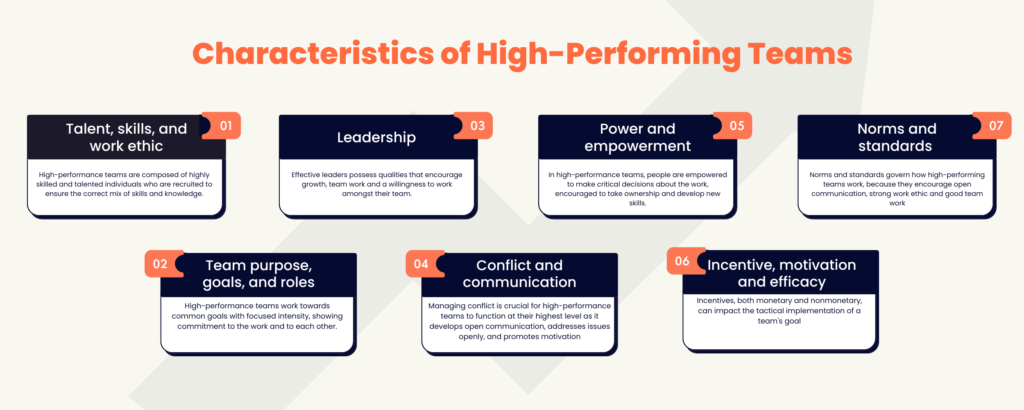Talent, skills, and work ethic
The skill and ability of each individual define high-performance teams. The most talented people are recruited as a matter of priority to ensure the correct mix of skills and knowledge.
Chosen team members are expected to demonstrate commitment to performance excellence, exercise candour and mutual respect for colleagues and managers, and hold themselves and their organisations accountable at individual and team levels.
Team purpose, goals, and roles
Working toward common goals with focused intensity is another core characteristic of high-performance teams, whether their work is long- or short-term. Team members show commitment to the work and to each other.
People excel when their roles are clear: in essence, they know how to do their jobs and why they are doing them. Each member supports the team’s mission and vision.
When the purpose is clear and tied to each person’s role and responsibilities, team potential is greatly enhanced.
This also includes what’s known as “stretch” goals, intentionally ambitious goals designed to challenge people to work towards greater goals; these tend to add an extra challenge to motivate team members.
Leadership
Equally ambitious and high-performing leaders often accompany a high-performing team.
Qualities of these effective leaders include, among others:
- The ability to keep the purpose, goals, and chosen approach to achieving goals relevant and meaningful
- Build commitment and confidence
- Support team members to enhance their skills and increase their value
- Manage internal and external relationships, ensuring to remove of obstacles that might hinder group performance
- Provide opportunities for others to grow and succeed without seeking credit
- And a willingness to do the work required to achieve business results.
Conflict and communication
High-performance teams require conflict management to function at the highest level.
Managing conflict helps team members develop the ability to communicate openly; here, the focus is on addressing issues openly and candidly. Open lines of communication are key to consistently high team performance; it matters for motivation, maintaining interest, and promoting cooperation.
Power and empowerment
High-performing work teams are likely to be empowered in a number of ways, which is also an important trait of their work success.
People are entrusted to make critical decisions about the work, they are encouraged to take more ownership of the work and to develop new skills along the way.
Researchers often refer to an ideal situation as “loose-tight,” meaning that clear decision-making boundaries exist, yet enough room exists for people to make empowered choices.
Incentive, motivation and efficacy
Incentives that are monetary and nonmonetary can have a positive impact on the effectiveness of a team. Specifically, they can impact the tactical implementation of a team’s goal.
But, it must be noted that over time, members of high-performing teams place more value on working on interesting projects as an indicator of personal satisfaction at work. This personal satisfaction at work, it turns out, is what’s needed to elevate team performance.
Norms and standards
Norms and standards help govern how high-performing teams work by establishing standards for open lines of communication, early resolution of conflict, regular evaluation of both individual and team performance, high levels of respect among members, a cohesive and supportive team environment, a strong work ethic that focuses on results and shared recognition of team successes.
High-performing teams discuss and agree to these standards – and each person agrees to uphold them and hold others accountable as well.


